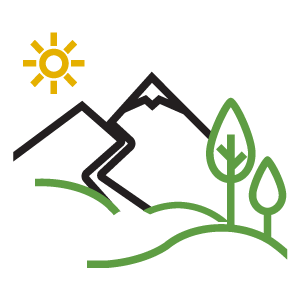BEII 2024 | High Level Panel: financing biodiversity to close the financial gap


Collective action for thriving nature and people
Birchwood Hotel and OR Tambo Conference Centre | 25 - 27 March 2024
1. HIGH- LEVEL PANEL ON FINANCING BIODIVERSITY TO CLOSE THE FINANCIAL GAP
Date: 25 March 2024 | Time: 11:00 - 13:00
Healthy, functioning ecosystems and diverse biodiversity assets are important to society and the economy. Combined impacts from climate change, loss of nature, and pollution create significant obstacles for strong, sustainable national development and economic growth. These create multi-faceted risks for vulnerable communities, environmental and human health, water security, our national, regional and global commitments, and the overall prosperity of South Africa's society and economy.
Opportunities to address these challenges and lead through turbulent times of global change will be found if the inextricable linkages between climate, biodiversity, society and the economy are recognised. This requires the integration of natural capital information into decision-making and policy. Natural capital accounting (NCA) offers a practical tool to measure how nature supports people and the economy.
NCA is the statistical framework that offers systematic measurement of stock and flows of natural resources, including both renewable and non-renewable resources, so that their state as well as the benefits they provide to society can be recognised, understood and integrated into policy, planning and decision‐making.
NCA is a broad term that includes accounting for individual environmental assets or resources, both biotic and abiotic (such as water, minerals, energy, timber, fish), as well as accounting for ecosystem assets and ecosystem services. The measurement framework used for NCA is the System of Environmental-Economic Accounting (SEEA).
The need for statistics has never been more apparent, with data requests covering a wide range of aspects of the economy, society and environment.
The demand for natural capital information has also grown with calls for national environmental indicators in the context of a range of different policies, including the National Development Plan (NDP), the District Development Model (DDM), the National Spatial Development Framework (NSDF), the sustainable development goals, and the Kunming-Montreal Global Biodiversity Framework which sets out an ambitious roadmap towards addressing biodiversity loss and the White Paper on Biodiversity Conservation and Sustainable Use. The African Ministerial Conference on the Environment (AMCEN) recognises that natural capital underpins the continent's economy and is fundamental to the achievement of the African Union Agenda 2063.
NCA helps to standardise and formalise statistics and indicators related to the environment, and to give them the same standing as economic and social statistics and indicators. In this way, NCA adds to the richness of evidence available to governments, businesses and individuals. This information is useful for decision-makers to monitor and assess the state of the environment, evaluate the performance of programmes and policies, evaluate risks and opportunities, explore future scenarios, and for country reporting on international resolutions and agreements. Integration of natural capital information into decision-making, policy and reporting requires raising awareness, increasing uptake and further investment in capacity and long-term datasets to support ongoing compilation of robust natural capital accounts.
Statistics South Africa (Stats SA), as the National Statistical Authority and Coordinator, lead the implementation of NCA in South Africa but they do so in partnership with others in line with the National NCA Strategy (Stats SA 2021). NCA is inherently multi-disciplinary, bringing together expertise, data and information from various organisations in a manner that encourages collaboration and partnership (which is essential in a fiscally constrained future).
While Stats SA leads overall on NCA for South Africa, it works closely in partnership with the Department of Forestry, Fisheries and the Environment (DFFE) and the South African National Biodiversity Institute (SANBI) in implementing the National NCA Strategy. Stats SA are also working more closely with Department of Water and Sanitation and Department of Tourism on natural capital accounts, including the National Water Accounts and Experimental Biodiversity Tourism Estimates.
South Africa is at the forefront of global developments in NCA. South Africa is one of only a few countries with a National NCA Strategy and a history of NCA spanning over two decades. Stats SA serve on the UN Committee of Experts on Environmental-Economic Accounting (UNCEEA), which oversees the development and refinement of the global standard for NCA and Stats SA, DFFE and SANBI are active members of the Africa NCA Community of Practice.
South Africa has a rich policy context that supports the use of information from natural capital accounts as evidence for policy and decision-making. The high-level panel on NCA aims to further enhance the uptake and integration of natural capital information in decision-making and policy in South Africa.
Furthermore, South Africa has a rich policy context that supports the use of information from natural capital accounts as evidence for policy and decision-making. NCA and related analyses meet the need for structured information, linking to policy and aim to result in greater benefits for people, nature, and economies. In addition, measuring the benefits of biodiversity can help to make the case for investing in biodiversity assets and the ecosystems that underpin the biodiversity economy. Furthermore, the session will culminate in the launch of the Accounts for Strategic Water Source Areas, 1990 to 2020.
PROPOSED RUNNING ORDER FOR THE SESSION: This is a plenary session which consists of presentations from different institutions as outlined in the scenarios presented below.
Chairperson: Mr Shonisani Munzhedzi, Chief Executive Officer (CEO): South African National Biodiversity Institute (SANBI)
|
Duration |
Item |
Responsibility |
|
5 Min |
Welcoming remarks |
Mr Shonisani Munzhedzi, CEO: SANBI |
|
10 Min |
Natural capital accounting in South Africa and its vision |
Mr Risenga Maluleke, Statistician General: Statistics South Africa |
|
10 Min |
Making nature count through natural capital accounting |
Dr Theressa Frantz, Chief Director: Biodiversity Assessment and Knowledge Generation, SANBI |
|
10 min |
Outlines the value of ecosystem services to South Africa's economy. |
Dr Sue Snyman, Director of Research: African Leadership University |
|
10 Min |
Minister Mchunu gives remarks on Accounts for Strategic Water Source Areas (SWSA) |
Minister Senzo Mchunu, Minister of Water and Sanitation |
|
5 min |
Closing remarks and vote of thanks |
Mr Shonisani Munzhedzi, CEO : SANBI |
The objectives of the session are to:
- To discuss the value and importance of natural capital information, from natural capital accounts, in broadening the diversity of knowledge available to decision and policymakers
- To launch the Accounts for Strategic Water Source Areas, 1990 to 2020.
2. BIODIVERSITY FINANCING
South Africa promotes sustainable use of biodiversity and recognises that biodiversity-based economic activities increase livelihood opportunities and enhance the resilience of communities, especially in rural landscapes, as articulated in the White Paper on Conservation and Sustainable Use of South Africa's Biodiversity. Biodiversity already does contribute and has the potential to contribute more towards many of the goals of the National Development Plan and the National Biodiversity Economy Strategy. The future of South Africa requires that we grow and transform the biodiversity sector. The aim is for people to live in harmony with nature by 2050.
New and additional financial resources is required from all sources across the public and private sector to facilitate achieving the ambitious goals and targets of the Kunming-Montreal Global Biodiversity Framework, the White Paper on the Conservation and Sustainable Use of South Africa's Biodiversity and National Biodiversity Economy Strategy. Resource constraints hinder the meaningful implementation, participation of communities and previously disadvantaged individuals in the sector. New and innovative approaches and mechanisms need to be identified and developed, including exploring fiscal reform, and aspects that incentivise conservation and sustainable use.
Effective implementation of the White Paper on the Conservation and Sustainable Use of South Africa's Biodiversity and the National Biodiversity Economy Strategy requires the whole of government and whole society approach. This includes implementation support mechanisms that are commensurate with the ambition set out in the goals and transformative changes required to reach them. Mobilising sufficient and accessible resources is therefore required for transformative, inclusive, and equitable change to achieve global commitments and national priorities.
The objectives of this session are to:
- To discuss innovative sustainable financial solutions and incentives for maintaining and growing conservation, sustainable use and Biodiversity Economy
- To discuss available funding mechanisms for the biodiversity sector and how to access them.
Approach:
- The session will start with an ice breaker led by the facilitator.
- The session will be in the form of questions to the panelists.
- The facilitator may open the floor for questions if time allows.
Chairperson: Mr Shonisani Munzhedzi, Chief Executive Officer (CEO): South African National Biodiversity Institute (SANBI)
|
Duration |
Item |
Speakers |
|
7 minutes |
What financial support is required to sustain conservation and grow the Biodiversity Economy. |
Mr Zolani Mkiva, The Congress of Traditional Leaders of South Africa. |
|
42 minutes (6 minutes for each organization) |
What are the available sources for new and additional financial resources to support biodiversity conservation, sustainable use and biodiversity economy? |
Mr Colin Porteous, Peace Parks Foundation |
|
Ms Adri Kitshoff-Botha, Custodians of Professional Hunting and Conservation South Africa. |
||
|
Mr Lebohang Phasha, National Empowerment Fund |
||
|
What funding mechanisms are available for the biodiversity sector and how to access them. |
Mr Maxwell Gomera, Resident Representative: United Nations Development Programme. |
|
|
How to Incentivize biodiversity conservation and grow the biodiversity economy in South Africa |
Mr Mark Gerrard, World Conservation Society |
|
|
8 minutes |
What is the role of NGOs in facilitating access to innovative sustainable finance and the role of incentives? |
Ms Candice Stevens: Sustainable Finance Coalition |
|
3 minutes |
Summary and Closing remarks |
Mr Shonisani Munzhedzi, Chief Executive Officer: South African National Biodiversity Institute. |














